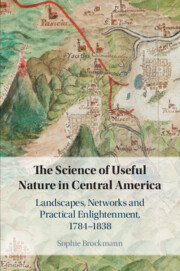 The Science of Useful Nature in Central America
The Science of Useful Nature in Central America Published online by Cambridge University Press: 27 August 2020
Chapter 5 argues that preoccupation with travel, topography, and geography merely formed the basis for even more ambitious projects that did, however, show the limits of what practical patriotism might achieve. When combined with a providential belief in the potential of the land, the application of geographical and botanical knowledge to the countryside meant that spaces which had hitherto been considered ‘empty’ or ‘wild’ could be filled with new meaning. Reformers were concerned with the role of people (Indians, but also Europeans, Africans, and Caribbeans of African descent, as well as enslaved people) in managing landscapes. They increasingly discussed questions of what we might call ‘biopower’ after Foucault, conceiving of labour and the management of the population as a resource. In this, reformers paid particular attention to the possibility that humans might influence environments in more profound ways than just by building roads. They hoped that human errors that had made Caribbean environments ‘unhealthy’ in the past could be reversed by building better-ventilated settlements, or regulating military barracks to help soldiers behave like agricultural settlers and make this land productive.
To save this book to your Kindle, first ensure no-reply@cambridge.org is added to your Approved Personal Document E-mail List under your Personal Document Settings on the Manage Your Content and Devices page of your Amazon account. Then enter the ‘name’ part of your Kindle email address below. Find out more about saving to your Kindle.
Note you can select to save to either the @free.kindle.com or @kindle.com variations. ‘@free.kindle.com’ emails are free but can only be saved to your device when it is connected to wi-fi. ‘@kindle.com’ emails can be delivered even when you are not connected to wi-fi, but note that service fees apply.
Find out more about the Kindle Personal Document Service.
To save content items to your account, please confirm that you agree to abide by our usage policies. If this is the first time you use this feature, you will be asked to authorise Cambridge Core to connect with your account. Find out more about saving content to Dropbox.
To save content items to your account, please confirm that you agree to abide by our usage policies. If this is the first time you use this feature, you will be asked to authorise Cambridge Core to connect with your account. Find out more about saving content to Google Drive.